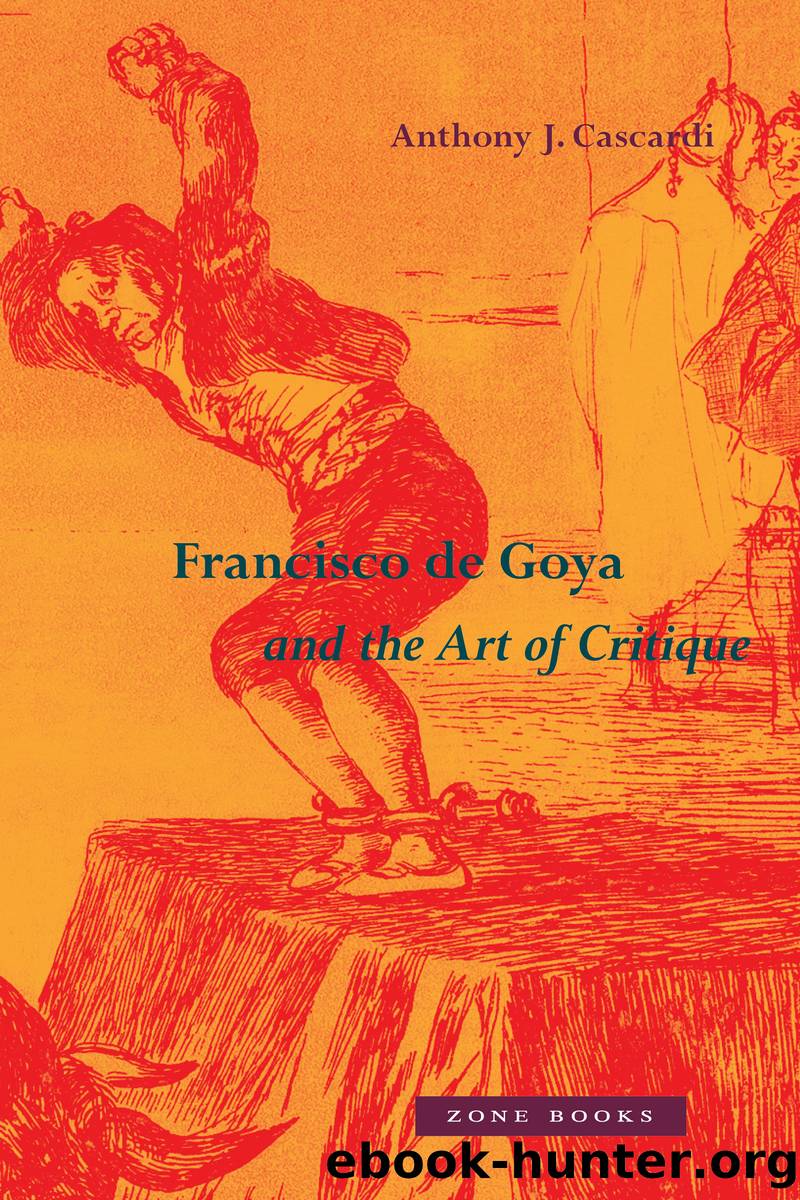Francisco de Goya and the Art of Critique by Anthony J. Cascardi

Author:Anthony J. Cascardi
Language: eng
Format: epub
Publisher: Zone Books
Published: 2022-08-04T00:00:00+00:00
* * *
It may of course be tempting to think that the authority of ethical obligations might simply be induced in the spectator-subject aesthetically or created as a function of the need to fill the space of some preexisting social, cultural, historical, or psychological need. Certainly in Kant, the vacuum created by the absence of any rational obligation to believe is filled by a disciplinary imperative to obey the ethical imperatives dictated by reason. As suggested above, this insures that the domain of ethics can be isolated as a function of the secular, autonomous, freely willing subject. âThe good will is not good because of what it effects or accomplishes or because of its adequacy to achieve some proposed end,â writes Kant, âit is good only because of its willing, i.e., it is good of itself.â36 But it was precisely because Kantâs call for autonomy, which relied on a concept of the rational will as sovereign, as answerable only to itself, required man to âmake himself into whatever he is or is to becomeâ that the Kantian critique of religion could be seen as but a veiled form of self-domination rather than as truly liberating human beings from indebtedness to the archaic traditions of the past. But so conceived, the Enlightenment project of critique conceals the fact that the rational subject marks an incomplete break with the traditions of religious belief, which provided an authoritative ground for ethical actions in the presecular world. Goya helps us see something different, that is, that the powers of reason are genealogically descended from forces of desire, self-deception, and false belief; hence, they continue to stand in need of precisely those controls that reason itself proves unable fully to provide. In the process, Goya dramatically restages the drama of Enlightenment envisioned by Kant, according to which the principal accomplishment of reason resides in the successful critiqueâand overcomingâof superstition, dogmatism, and the uncritical acceptance of inherited beliefs. Understood as a corrective to the Enlightenmentâs understanding of itself, Goyaâs work is grounded in a more complex appreciation of the fact that the rational institutions of the enlightened world are not in fact autonomous, but represent the ongoing responses to the demand that the archaic sources of authority somehow be brought under control. The history of the present is laden with the freight of the past, which in turn means that ethical obligations cannot effectively be built upon the foundations of the free, rational will.
Download
This site does not store any files on its server. We only index and link to content provided by other sites. Please contact the content providers to delete copyright contents if any and email us, we'll remove relevant links or contents immediately.
Kathy Andrews Collection by Kathy Andrews(10501)
The remains of the day by Kazuo Ishiguro(7537)
Spare by Prince Harry The Duke of Sussex(4187)
Paper Towns by Green John(4162)
The Body: A Guide for Occupants by Bill Bryson(3787)
Be in a Treehouse by Pete Nelson(3204)
Harry Potter and the Goblet Of Fire by J.K. Rowling(3020)
Goodbye Paradise(2947)
Never by Ken Follett(2867)
Into Thin Air by Jon Krakauer(2692)
The Remains of the Day by Kazuo Ishiguro(2612)
The Genius of Japanese Carpentry by Azby Brown(2600)
The Cellar by Natasha Preston(2590)
Drawing Shortcuts: Developing Quick Drawing Skills Using Today's Technology by Leggitt Jim(2524)
120 Days of Sodom by Marquis de Sade(2425)
Architecture 101 by Nicole Bridge(2347)
The Man Who Died Twice by Richard Osman(2287)
Machine Learning at Scale with H2O by Gregory Keys | David Whiting(2254)
Fairy Tale by Stephen King(2057)
